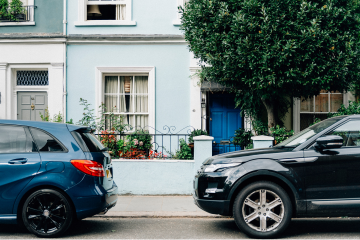"You might find your car insurance prices start creeping up again once you’re in your 70s. If you have a medical condition that could affect your driving, it’s important you declare it to the DVLA and your insurer. Being involved in an accident as the result of an undeclared condition could land you with a £1,000 fine and your insurance not paying out."
Is car insurance more exensive for over-70s?
Car insurance is less expensive for over 70s compared to most other age groups. Even over 50s car insurance tends to be more expensive.
Our data shows the average car insurance price for those aged 70+ is £495. This makes it the second cheapest of any age group, after drivers in their 60s, who pay £479.
These low prices are due to the fact that older drivers generally have more years of experience behind the wheel. They often have a larger no-claims bonus built up too.
That said, once drivers hit 70, their insurance does tend to creep up. This explains why drivers in their 60s actually see lower costs than those who are 70+.
While there's a lot that goes into how your car insurance is calculated, this tends to be due to the fact that senior drivers are considered more likely to have an accident.
Here’s the average car insurance premium for each age group:
| Age | Average Cost1 |
|---|---|
|
20-29
|
£1,365
|
|
30-39
|
£939
|
|
40-49
|
£752
|
|
50-59
|
£586
|
|
60-69
|
£479
|
|
70+
|
£495
|
1Confused.com Price Index data Q1 2025.
How can I get the best price for over 70s car insurance?
As long as you have a good driving history, you should still be able to get relatively cheap car insurance once you're over 70. But don’t be disheartened if your quote has increased on last year’s, because there are a few things you can do to help lower the price:
Accurately estimate your mileage
Insurers use mileage as a factor when calculating the cost of your insurance. You might find you’re doing fewer miles now that you’re in your 70s. Reducing the total mileage – even slightly – might help save you money.
Choose 'retired' not 'unemployed'
If you're retired, make sure you choose that option rather than 'unemployed' when getting a quote. Being retired doesn't necessarily mean you'll see cheaper prices. But if your occupation before retirement was considered higher risk by insurers, you could see your costs come down.
Increase your voluntary excess
Opting to pay a higher voluntary excess can sometimes lead to lower insurance costs. Just make sure you can afford to pay the selected amount if you make a claim.
Avoid auto renewal
You should get a renewal quote from your insurer when your insurance is due to expire. It’s tempting to accept the first offer, there could be savings to be made by comparing quotes.
The good news is, all insurers are legally required to show you what you paid last year. This makes it even easier to see whether you’re being charged more for the same level of cover. We encourage comparing quotes and switching when you find a better deal.
Consider black box insurance
If you do drive fewer miles than you used to, you might benefit from a pay-as-you-go insurance policy. Similar to a telematics policy, it uses a black box device or mobile phone app that monitors your mileage. Unlike most telematics policies, a pay-as-you-go policy doesn't monitor other driving behaviours.
Pay annually rather than monthly
If you can afford to, paying in one lump sum could be an easy way to save. Most insurers charge interest if you choose to pay monthly. If you can afford to pay for the whole policy in one go, then you could save up to 50%2 on your quote vs monthly payments.
Find out more ways to get cheaper car insurance.
2Confused.com data Q4 2024.
We compare up to 168 trusted insurance companies, including specialist over 70s companies




What do I need to compare over-70s car insurance quotes?
Personal details:
- Your occupation, address, date of birth and how long you've held your licence.
- Any points on your licence – including any convictions.
- Previous claims or accidents that happened in the last 5 years.
- Your driving licence type and number. Learn how to check your driving licence.
- Details of any medical conditions that might affect your ability to drive or restrict your licence.
- Details of your no-claims bonus (NCB) in years.
Car details:
- Registration number or make and model of your car
- Any modifications you’ve made to your car
- Estimated annual mileage
If you’ve used us before to get a quote, you can log in to your Confused.com account to make things quicker.
Check your details are up to date, as things may have changed since you last used us.
Will my health affect my car insurance at 70?
As we get older we're more prone to develop health conditions that affect our ability to drive. Insurers see this as a higher risk, which can increase the price you pay for car insurance as an older driver.
If you have a medical condition that could affect your driving, then you need to declare it to the DVLA and your insurer. These conditions include, but aren’t limited to:
- Epilepsy
- Diabetes
- Parkinson’s disease
- Heart conditions
- Visual impairments
- Strokes
- Sleep apnoea
If you develop a condition or disability, it's your responsibility to let the DVLA know about it. Once the DVLA are notified and have assessed the condition, they'll decide:
- Whether you get a new driving licence
- If you should renew your licence more often - for example, every 1 or 2 years rather than the standard 3 for over 70s
- Whether you need to adapt your car by fitting special controls
- If you must stop driving and give up your licence
Based on their decision, you should notify your insurer to let them know of a change in your circumstances.
For more information, visit GOV.UK's section on driving and medical conditions.
When you get a quote, we'll ask you whether you have any DVLA-reported medical conditions or disabilities. This includes any conditions that the DVLA believes will affect your ability to drive, or restrict your licence.
What our expert says:
Our customers say:










